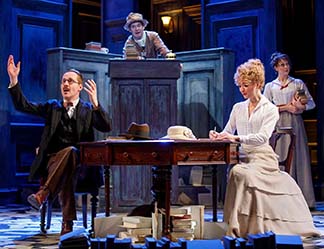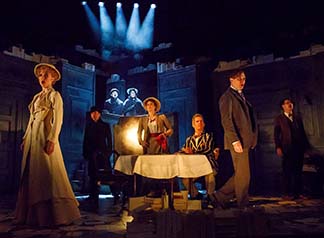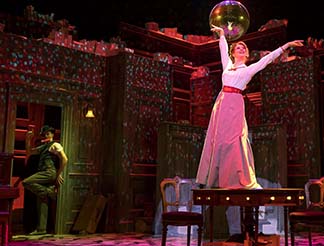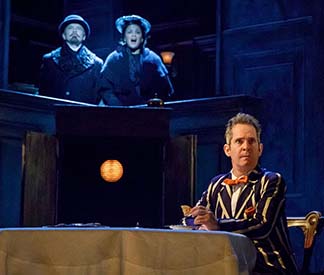By Lucy Komisar

“Travesties” is a glorious kaleidoscope of famous people, fiction and events that converge in Zurich during World War I and raise questions about radical politics, the meaning of art, and the validity of memory to link it all.
Tom Stoppard pays homage to and questions absurdist and revolutionary art in a play which presents three great figures of the time through the clouded memory of a retired British diplomat posted in Zurich during the Great War. It is a brilliant historical fantasy directed by Patrick Marber.
The characters are novelist James Joyce (Peter McDonald), artist and poet Tristan Tzara (Seth Numrich), and Russian revolutionary Vladimir Lenin (Dan Butler). They are connected through the device of Oscar Wilde‘s “The Importance of Being Earnest.” Cecily (Sara Topham), a Wilde character, works at the Zurich Library where the three are writing – Joyce on Ulysses, Tzara on his poetry and DaDa interpretation of art, and Lenin on communist tracts.

Though Stoppard throws them together, they never really met, though the consul, Henry Carr (Tom Hollander), did know Joyce, because he performed in the Wilde play for The English Players, a theater company Joyce ran. Travesties is supposed to mean a parody or farce. And their figures in this story should not be taken seriously.
But one might consider seriously one thread, the meaning of art. Is it for social betterment or for itself. But Stoppard keeps us from getting too serious.
The absurd exists on various levels. Carr is concerned about his tailoring, striped trousers to be exact. He complains that being in trenches destroyed his elegant clothes. On the other side, Tzara is an inventor of DaDa. He makes poems by cutting up Shakespearean sonnets and dropping the scraps in a hat, to be thrown out like dice. Lenin is writing “imperialism, the highest stage of capitalism.” Meanwhile in Russia, the Czar has abdicated, and Krensky is for common people.

Carr‘s servant Bennett (Patrick Kerr), obviously more sophisticated – and more snooty — than his employer, explains Marxism, though he errs in predicting that Russia will be a parliamentary democracy in the British model.
BENNETT There is a revolution in Russia, sir.
CARR Really? What sort of revolution?
BENNETT A social revolution, sir.
CARR A social revolution? Unaccompanied women smoking at the Opera, that sort of thing?
BENNETT Not precisely that, sir. It is more in the nature of a revolution of classes contraposed by the fissiparous disequilibrium of Russian society.
CARR What do you mean, classes?
BENNETT Masters and servants. As it were. Sir.
CARR Oh. Masters and servants.
But how to take seriously Lenin contemplating sneaking back into Russia with a garish blonde wig!
Can that be more absurd than James Joyce doing limericks?
As much as it is about art, this is a fine very fine political play.

Cecily the librarian, who carries a red flag, has a principled radical view of art, which should have as its purpose to reform society.
That’s not the view of Carr, who declares to Tzara, “Don‘t you see my dear Tristan, you are simply asking me to accept that the word Art means whatever you wish it to mean; but I do not accept it.”
But Stoppard puts him in his place.
TZARA Why not? You do exactly the same thing with words like patriotism, duty, love, freedom, King and country, brave little Belgium, saucy little Serbia – all the traditional sophistries for waging wars of expansion and self-interest, presented to the people in the guise of rational argument set to patriotic hymns … Music is corrupted, language conscripted. Words are taken to stand for their opposites. That is why anti-art is the art of our time.‘
Then he tells Carr, “Wars are fought for oil wells and coaling stations; for control of the Dardanelles or the Suez Canal; for colonial pickings to buy cheap in and conquered markets to sell dear in. War is capitalism with the gloves off and many who go to war know it but they go to war because they don‘t want to be a hero. It takes courage to sit down and be counted.”
Ah, that was first presented in 1973. With a clear route to the present!
Carr attacks him: “I won‘t be told by some yellow-bellied Bolshevik that I ended up in the trenches because there‘s a profit in ball-bearings!” (Well, note ye old military industrial complex, Boeing, etc. Wars make billions for arms traffickers merchants.)

TZARA (storming) Quite right! You ended up in the trenches, because the heir to the throne of Austro-Hungary married beneath him and found that the wife he loved was never allowed to sit next to him on royal occasions, except when he was acting in his military capacity as Inspector General of the Austro-Hungarian army – in which capacity he therefore decided to inspect the army in Bosnia, so that at least on their wedding anniversary, the 28th June 1914, they might ride side by side in an open carriage through the streets of Sarajevo! (sentimentally) Aaaaah! (Then slaps his hands sharply together like a gun-shot).
Lenin has no patience for Tzara: “Dadaists! Decadent nihilists.”
Carr would agree: “Revolution in art is in no way connected with class revolution. Artists are members of a privileged class.” Tzara, a charmer in gray vest and purple tie, calls him an ignorant philistine in fancy pants!”
Patrick Marber‘s terrific staging includes a seductive Marxist-Leninist dance with the principals in glittery erotic costume. To get serious, Lenin says “dada” to himself, but announces Party control of books.
We look through the prism of Carr’s memory years later. It’s fact-based-fiction. Or Stoppard’s own take. The acting, of course, is superb. I loved the sometimes over-the-top Seth Numrich as Tzara. This is the best play revival of the season. Of many seasons.
“Travesties.” Written by Tom Stoppard; directed by Patrick Marber. American Airlines Theater, 227 W. 42nd St., NYC. 212-719-1300. Opened April 24, 2018, closes June 17, 2018. Running time 2:30. 5/28/18.

